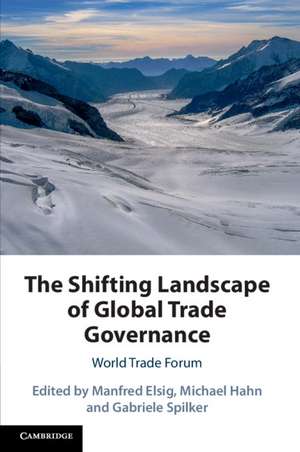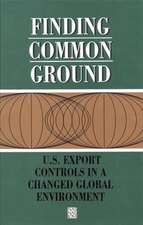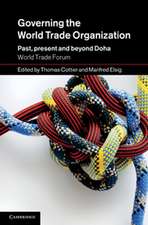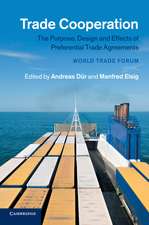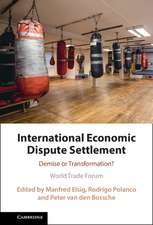The Shifting Landscape of Global Trade Governance: World Trade Forum
Editat de Manfred Elsig, Michael Hahn, Gabriele Spilkeren Limba Engleză Paperback – 30 iun 2021
| Toate formatele și edițiile | Preț | Express |
|---|---|---|
| Paperback (1) | 325.16 lei 6-8 săpt. | |
| Cambridge University Press – 30 iun 2021 | 325.16 lei 6-8 săpt. | |
| Hardback (1) | 660.29 lei 39-44 zile | |
| Cambridge University Press – 7 aug 2019 | 660.29 lei 39-44 zile |
Preț: 325.16 lei
Nou
Puncte Express: 488
Preț estimativ în valută:
62.22€ • 66.53$ • 51.88£
62.22€ • 66.53$ • 51.88£
Carte tipărită la comandă
Livrare economică 17 aprilie-01 mai
Preluare comenzi: 021 569.72.76
Specificații
ISBN-13: 9781108707442
ISBN-10: 1108707440
Pagini: 446
Ilustrații: 28 b/w illus. 14 tables
Dimensiuni: 152 x 228 x 23 mm
Greutate: 0.59 kg
Editura: Cambridge University Press
Colecția Cambridge University Press
Locul publicării:Cambridge, United Kingdom
ISBN-10: 1108707440
Pagini: 446
Ilustrații: 28 b/w illus. 14 tables
Dimensiuni: 152 x 228 x 23 mm
Greutate: 0.59 kg
Editura: Cambridge University Press
Colecția Cambridge University Press
Locul publicării:Cambridge, United Kingdom
Cuprins
1. Introduction: current challenges and future scenarios Manfred Elsig, Michael Hahn and Gabriele Spilker; Part I. New and Old Challenges: 2. The elephant in the negotiation room: PTAs through the eyes of citizens Quynh Nguyen and Gabriele Spilker; 3. Corporate strategy in times of anti-trade sentiment: current challenges and future scenarios Jappe Eckhardt and Louise Curran; 4. Understanding and shaping trade rules for the digital era Mira Burri; 5. The need for better disciplines on rules of origins in the WTO: evidence from NAFTA Caroline Freund; 6. For whom the bell tolls: the WTO's third decade Michael Hahn; Part II. Trade Policy and Trade-Related Concerns: 7. Reconceiving trade agreements for social inclusion Gregory Shaffer; 8. Our alarming climate crisis demands border adjustments now John Odell; 9. The multilateralization of PTAs' environmental clauses: scenarios for the future? Jean-Frédéric Morin, Clara Brandi and Axel Berger; 10. The trend to more and stricter non-trade issues in preferential trade agreements Lisa Lechner; Part III. Development Angles: 11. The trade-migration nexus from a multilevel perspective Flavia Jurje and Sandra Lavenex; 12. Trips implementation in developing countries: likely scenarios to 2025 Omar Serrano and Mira Burri; 13. Investment promotion and facilitation for LDCs Rodrigo Polanco Lazo and Azernoosh Bazrafkan; Part IV. Diffusion across Economic Treaties: 14. Heading for divorce? Investment protection rules in free trade agreements Wolfgang Alschner; 15. The regime complex for investment governance: overlapping provisions in PTAs and BITs Soo Yeon Kim and Clara Lee; 16. Asian Trade agreements in services: filling form with content Mark Manger.
Recenzii
'The WTO is not living its best moments, and what this book does better than any other volume is to highlight the reasons why this has been the case. By highlighting the concerns that have not been addressed, the voices that have not been heard, as well as the faux pas taken by those in charge, this volume offers an unparalleled collection of well-thought papers that should find their way to the desk of every policymaker steering the world trading system these days.' Petros C. Mavroidis, Edwin B. Parker Professor of Foreign & Comparative Law, Columbia University, New York
Descriere
Takes stock of current challenges to the world trading system and develops scenarios for the future.
